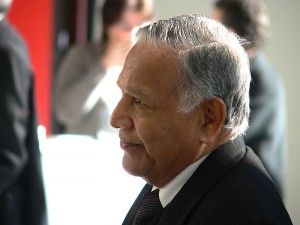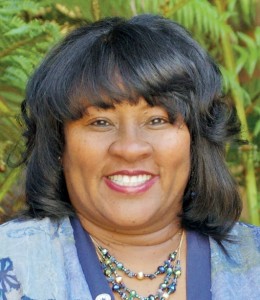Faiths United Against Nuclear Weapons
VIENNA, Dic 10 (IPS) - "Never was there a greater need than now for all the religions to combine, to pull their wisdom and to give the benefit of that combined, huge repository of wisdom to international law and to the world."
The words are those of Christopher Weeramantry, former judge at the International Court of Justice (ICJ) and its vice-president from 1997 to 2000, who was addressing a session on faiths united against nuclear weapons at the civil society forum organised by the International Campaign to Abolish Nuclear Weapons (ICAN) on Dec. 6 and 7 in the Austrian capital.
 Former ICJ judge Christopher Weeramantry. Credit: Henning Blatt, Wikimedia
Former ICJ judge Christopher Weeramantry. Credit: Henning Blatt, Wikimedia
Weeramantry strongly criticised the argument of those who claim that nuclear weapons have saved the world from another world war in the last 50 years.
He pointed to the ever-present danger represented by these weapons and said that on many occasions it had been luck that had prevented catastrophic nuclear accidents or the breaking out of a devastating nuclear war.
Noting that nuclear weapons "offend every single principle of religion," Weeramantry was joined on the panel by a number of different religious leaders, including Mustafa Ceric, Grand Mufti of Bosnia and Herzegovina, Ela Gandhi, granddaughter of Mahatma Gandhi and peace activist, as well as Akemi Bailey-Haynie, national women's leader of the Buddhist organisation Soka Gakkai International-USA.
Although there often seems to be a gap between the positions of different faith communities concerning different issues, all panellists were very clear in pushing the moral imperative and declaring the similar values that are inherent to all religions.3
According to Mustafa Ceric, it "is not the question of whether you believe, it is the question of whether we are going to wait and see the destruction of our planet."
Ceric also stressed that the goals and values of humanity are defined by common moral and ethical standards and that the role of religious communities today is greater than ever. Faced with fear and mistrust in society, he said, they also have the responsibility to care for peace and security in the world.
Akemi Bailey-Haynie continued with an emotional statement from first-hand experience – her own mother was a survivor of the Hiroshima bombing in 1945.
"When nuclear weapons are considered a deterrent or viable option in warfare, it seems from a mind-set that fundamentally denies that all people possess infinite potential. No one has the right to take away a precious life of another human being."
 Akemi Bailey-Haynie, national women's leader of the Buddhist organisation Soka Gakkai International-USA. Credit: SGI
Akemi Bailey-Haynie, national women's leader of the Buddhist organisation Soka Gakkai International-USA. Credit: SGI
For Bailey-Haynie, nuclear weapons serve no purpose other than mass destruction. They have devastating effects on human beings and the environment, and the possibility of nuclear accidents or potential terrorism cannot be ruled out, she said, adding that dialogue between people of different or opposing opinions is the beginning to achieve change regarding this issue.
"As a second generation survivor, I deeply feel the sorrow, as well as the outrage, born of not being able to yet live in a time when the most inhumane of weapons, nuclear weapons, have been banned," she concluded.
Desmond Tutu, Nobel Peace Laureate and former Anglican Bishop, sent a video message to participants to express his deep solidarity and support for ICAN's civil society forum initiative.
He argued that the best way to honour the victims of the incidents in Hiroshima and Nagasaki was to negotiate a total ban on nuclear weapons to ensure that nothing comparable could ever happen again.
Two of the session's speakers, Ela Gandhi and Mustafa Ceric, also attended the Dec. 8-9 Vienna Conference on the Humanitarian Impact of Nuclear Weapons.
There, Ela Gandhi delivered a speech in the spirit of her grandfather who, she said, would have joined the movement to abolish nuclear weapons if still alive.
As Gandhi had dedicated his life to teaching humanity that there is a non-violent way of dealing with conflict, he even condemned nuclear weapons himself in 1946 when he said: "The atom bomb mentality is immoral, unethical, addictive and only evil can come from it."
Pointing out that the mere existence of nuclear weapons leads to similar armament of rival countries, Ela Gandhi warned that these nuclear arsenals could destroy a chance for future generations to survive and have a prosperous life.
The Conference on the Humanitarian Impact of Nuclear Weapons was the scene of intense and often emotional discussions among official representatives from over 160 countries, victims and civil society participants. Notably, both the United States and the United Kingdom were officially represented for the first time at a conference where their nuclear arsenals were subject to debate and criticism.
Religion played an important role at the conference, where many lobbying groups had religious backgrounds, and the opening ceremony was addressed by Pope Francis.
"I am convinced that the desire for peace and fraternity, planted deep in the human heart, will bear fruit in concrete ways to ensure that nuclear weapons are banned once and for all, to the benefit of our common home," aid Pope Francis, expressing his hope that "a world without nuclear weapons is truly possibly."
In a statement on behalf of faith communities to the final session, Kimiaki Kawai, Program Director for Peace Affairs at Soka Gakkai International (SGI), said: "The elimination of nuclear weapons is not only a moral imperative; it is the ultimate measure of our worth as a species, as human beings."
He said that "acceptance of the continued existence of nuclear weapons stifles our capacity to think more broadly and more compassionately about who we are as human beings, and what our potential is. Humanity must find alternative ways of dealing with conflict."
(Edited by Phil Harris)
© Inter Press Service (2014) — All Rights ReservedOriginal source: Inter Press Service
 Global Issues
Global Issues